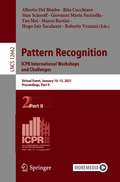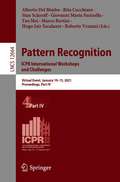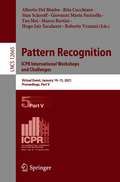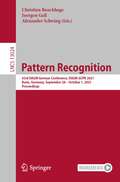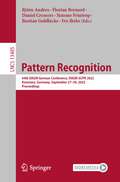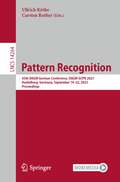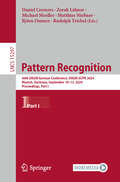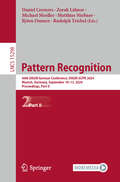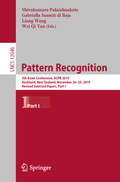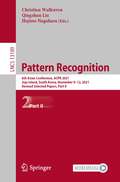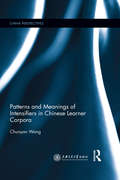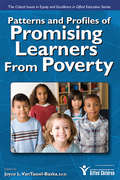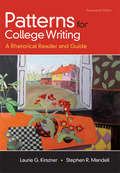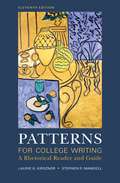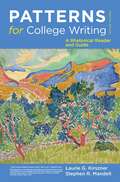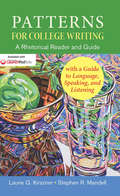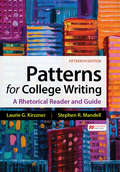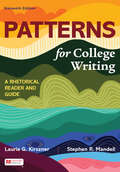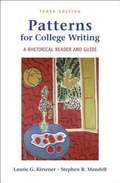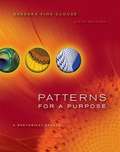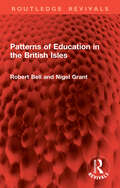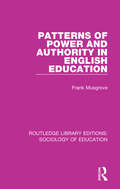- Table View
- List View
Pattern Recognition. ICPR International Workshops and Challenges: Virtual Event, January 10–15, 2021, Proceedings, Part II (Lecture Notes in Computer Science #12662)
by Marco Bertini Giovanni Maria Farinella Hugo Jair Escalante Alberto Del Bimbo Stan Sclaroff Rita Cucchiara Tao Mei Roberto VezzaniThis 8-volumes set constitutes the refereed of the 25th International Conference on Pattern Recognition Workshops, ICPR 2020, held virtually in Milan, Italy and rescheduled to January 10 - 11, 2021 due to Covid-19 pandemic. The 416 full papers presented in these 8 volumes were carefully reviewed and selected from about 700 submissions. The 46 workshops cover a wide range of areas including machine learning, pattern analysis, healthcare, human behavior, environment, surveillance, forensics and biometrics, robotics and egovision, cultural heritage and document analysis, retrieval, and women at ICPR2020.
Pattern Recognition. ICPR International Workshops and Challenges: Virtual Event, January 10–15, 2021, Proceedings, Part IV (Lecture Notes in Computer Science #12664)
by Marco Bertini Giovanni Maria Farinella Hugo Jair Escalante Alberto Del Bimbo Stan Sclaroff Rita Cucchiara Tao Mei Roberto VezzaniThis 8-volumes set constitutes the refereed of the 25th International Conference on Pattern Recognition Workshops, ICPR 2020, held virtually in Milan, Italy and rescheduled to January 10 - 11, 2021 due to Covid-19 pandemic. The 416 full papers presented in these 8 volumes were carefully reviewed and selected from about 700 submissions. The 46 workshops cover a wide range of areas including machine learning, pattern analysis, healthcare, human behavior, environment, surveillance, forensics and biometrics, robotics and egovision, cultural heritage and document analysis, retrieval, and women at ICPR2020.
Pattern Recognition. ICPR International Workshops and Challenges: Virtual Event, January 10–15, 2021, Proceedings, Part V (Lecture Notes in Computer Science #12665)
by Marco Bertini Giovanni Maria Farinella Hugo Jair Escalante Alberto Del Bimbo Stan Sclaroff Rita Cucchiara Tao Mei Roberto VezzaniThis 8-volumes set constitutes the refereed of the 25th International Conference on Pattern Recognition Workshops, ICPR 2020, held virtually in Milan, Italy and rescheduled to January 10 - 11, 2021 due to Covid-19 pandemic. The 416 full papers presented in these 8 volumes were carefully reviewed and selected from about 700 submissions. The 46 workshops cover a wide range of areas including machine learning, pattern analysis, healthcare, human behavior, environment, surveillance, forensics and biometrics, robotics and egovision, cultural heritage and document analysis, retrieval, and women at ICPR2020.
Pattern Recognition: 43rd DAGM German Conference, DAGM GCPR 2021, Bonn, Germany, September 28 – October 1, 2021, Proceedings (Lecture Notes in Computer Science #13024)
by Juergen Gall Christian Bauckhage Alexander SchwingThis book constitutes the refereed proceedings of the 43rd DAGM German Conference on Pattern Recognition, DAGM GCPR 2021, which was held during September 28 – October 1, 2021. The conference was planned to take place in Bonn, Germany, but changed to a virtual event due to the COVID-19 pandemic.The 46 papers presented in this volume were carefully reviewed and selected from 116 submissions. They were organized in topical sections as follows: machine learning and optimization; actions, events, and segmentation; generative models and multimodal data; labeling and self-supervised learning; applications; and 3D modelling and reconstruction.
Pattern Recognition: 44th DAGM German Conference, DAGM GCPR 2022, Konstanz, Germany, September 27–30, 2022, Proceedings (Lecture Notes in Computer Science #13485)
by Daniel Cremers Simone Frintrop Björn Andres Florian Bernard Bastian Goldlücke Ivo IhrkeThis book constitutes the refereed proceedings of the 44th DAGM German Conference on Pattern Recognition, DAGM GCPR 2022, which was held during September 27 – 30, 2022.The 37 papers presented in this volume were carefully reviewed and selected from 78 submissions. They were organized in topical sections as follows: machine learning methods; unsupervised, semi-supervised and transfer learning; interpretable machine learning; low-level vision and computational photography; motion, pose estimation and tracking; 3D vision and stereo; detection and recognition; language and vision; scene understanding; photogrammetry and remote sensing; pattern recognition in the life and natural sciences; systems and applications.
Pattern Recognition: 45th DAGM German Conference, DAGM GCPR 2023, Heidelberg, Germany, September 19–22, 2023, Proceedings (Lecture Notes in Computer Science #14264)
by Carsten Rother Ullrich KötheThis book constitutes the proceedings of the 45th Annual Conference of the German Association for Pattern Recognition, DAGM-GCPR 2023, which took place in Heidelberg, Germany, during September 19-22, 2023. The 40 full papers included in these proceedings were carefully reviewed and selected from 76 submissions. They were organized in topical sections as follows: Segmentation and action recognition; 3D reconstruction and neural rendering; Photogrammetry and remote sensing; Pattern recognition in the life sciences; Interpretable machine learning; Weak supervision and online learning; Robust models.
Pattern Recognition: 46th DAGM German Conference, DAGM GCPR 2024, Munich, Germany, September 10–13, 2024, Proceedings, Part I (Lecture Notes in Computer Science #15297)
by Daniel Cremers Zorah Lähner Michael Moeller Matthias Nießner Björn Ommer Rudolph TriebelThis 2-volume set LNCS 15297-15298 constitutes the refereed proceedings of the 46th Annual Conference of the German Association for Pattern Recognition, DAGM-GCPR 2024, held in Munich, Germany, during September 10-13, 2024.The 44 full papers included in these proceedings were carefully reviewed and selected from 81 submissions. They are organized in these topical sections:Part I: Clustering and Segmentation; Learning Techniques; Medical and Biological Applications; Uncertainty and Explainability.Part II: Modelling of Faces and Shapes; Image Generation and Reconstruction; 3D Analysis and Sythesis; Video Analysis; Photogrammetry and Remote Sensing.
Pattern Recognition: 46th DAGM German Conference, DAGM GCPR 2024, Munich, Germany, September 10–13, 2024, Proceedings, Part II (Lecture Notes in Computer Science #15298)
by Daniel Cremers Zorah Lähner Michael Moeller Matthias Nießner Björn Ommer Rudolph TriebelThis 2-volume set LNCS 15297-15298 constitutes the refereed proceedings of the 46th Annual Conference of the German Association for Pattern Recognition, DAGM-GCPR 2024, held in Munich, Germany, during September 10-13, 2024.The 44 full papers included in these proceedings were carefully reviewed and selected from 81 submissions. They are organized in these topical sections:Part I: Clustering and Segmentation; Learning Techniques; Medical and Biological Applications; Uncertainty and Explainability.Part II: Modelling of Faces and Shapes; Image Generation and Reconstruction; 3D Analysis and Sythesis; Video Analysis; Photogrammetry and Remote Sensing.
Pattern Recognition: 5th Asian Conference, ACPR 2019, Auckland, New Zealand, November 26–29, 2019, Revised Selected Papers, Part I (Lecture Notes in Computer Science #12046)
by Liang Wang Wei Qi Yan Shivakumara Palaiahnakote Gabriella Sanniti di BajaThis two-volume set constitutes the proceedings of the 5th Asian Conference on ACPR 2019, held in Auckland, New Zealand, in November 2019. The 9 full papers presented in this volume were carefully reviewed and selected from 14 submissions. They cover topics such as: classification; action and video and motion; object detection and anomaly detection; segmentation, grouping and shape; face and body and biometrics; adversarial learning and networks; computational photography; learning theory and optimization; applications, medical and robotics; computer vision and robot vision; pattern recognition and machine learning; multi-media and signal processing; and interaction.
Pattern Recognition: 6th Asian Conference, ACPR 2021, Jeju Island, South Korea, November 9–12, 2021, Revised Selected Papers, Part II (Lecture Notes in Computer Science #13189)
by Qingshan Liu Christian Wallraven Hajime NagaharaThis two-volume set LNCS 13188 - 13189 constitutes the refereed proceedings of the 6th Asian Conference on Pattern Recognition, ACPR 2021, held in Jeju Island, South Korea, in November 2021. The 85 full papers presented were carefully reviewed and selected from 154 submissions. The papers are organized in topics on: classification, action and video and motion, object detection and anomaly, segmentation, grouping and shape, face and body and biometrics, adversarial learning and networks, computational photography, learning theory and optimization, applications, medical and robotics, computer vision and robot vision.
Patterns and Meanings of Intensifiers in Chinese Learner Corpora (China Perspectives)
by Chunyan WangIntensification plays a major role in spoken and written interaction, enabling the writer or speaker to express different levels of commitment. This book explores the patterns and meanings of intensifiers in Chinese learner English by ways of comparison with native English. The study is conducted within the theoretical framework of Firthian contextual theory of meaning, Sinclairian model of Extended Units of Meaning (EUM) and Hunston's pattern grammar. The method of contrastive inter-language analysis (CIA) is adopted and the intensifier collocations in learner English and native English are explored by means of quantitative and qualitative analyses of corpora data. This book is the first attempt to investigate the patterning and meaning features of intensifiers systematically with the corpora data in Chinese learner English. Readers will obtain a relatively complete picture of how Chinese learners use intensifiers to realize their attitudinal meanings.
Patterns and Profiles of Promising Learners from Poverty
by Joyce Vantassel-BaskaPatterns and Profiles of Promising Learners From Poverty provides a comprehensive review of the issues surrounding the education and inclusion of promising students from poverty in gifted and talented programs.
Patterns for College Writing: A Rhetorical Reader And Guide
by Laurie G. Kirszner Stephen R. MandellLaurie Kirszner and Stephen Mandell, authors with thirty years of experience teaching college writing, know what works in the classroom and have a knack for picking just the right readings. <P><P> In Patterns for College Writing, they provide students with exemplary rhetorical models and instructors with class-tested selections that balance classic and contemporary essays. Along with more examples of student writing than any other reader, Patterns has the most comprehensive coverage of active reading, research, and the writing process, with a five-chapter mini-rhetoric; the clearest explanations of the patterns of development; the most thorough apparatus of any rhetorical reader; and the most comprehensive coverage of argumentative writing―all reasons why Patterns for College Writing is the best-selling reader in the country. <P>And the new edition includes exciting new readings, images, and debate and casebook topics.
Patterns for College Writing: A Rhetorical Reader and Guide
by Laurie G. Kirszner Stephen R. MandellNIMAC-sourced textbook
Patterns for College Writing: A Rhetorical Reader and Guide
by Laurie G. Kirszner Stephen R. MandellClick here to find out more about the 2009 MLA Updates and the 2010 APA Updates. Laurie Kirszner and Stephen Mandell, best-selling authors and experienced teachers, know what works in the classroom. They have a knack for picking just the right readings. In Patterns for College Writing, they provide students with exemplary rhetorical models and instructors with class-tested selections. The readings are a balance of classic and contemporary essays by writers such as Sandra Cisneros, Deborah Tannen, E. B. White, and Henry Louis Gates Jr. And with more examples of student writing than any other reader,Patterns has always been an exceptional resource for students. Patterns also has the most comprehensive coverage of the writing process in a rhetorical reader with a five-chapter mini-rhetoric; the clearest explanations of the patterns of development; and the most thorough support for students of any rhetorical reader. With loads of exciting new readings and updated coverage of working with sources,Patterns for College Writing helps students as no other book does. There's a reason it is the best-selling reader in the country.
Patterns for College Writing: A Rhetorical Reader and Guide
by Laurie G. Kirszner Stephen R. MandellLaurie Kirszner and Stephen Mandell, authors with nearly thirty years of experience teaching college writing, know what works in the classroom and have a knack for picking just the right readings. InPatterns for College Writing, they provide students with exemplary rhetorical models and instructors with class-tested selections that balance classic and contemporary essays. Along with more examples of student writing than any other reader,Patternshas the most comprehensive coverage of active reading, research, and the writing process, with a five-chapter mini-rhetoric; the clearest explanations of the patterns of development; and the most thorough apparatus of any rhetorical reader, all reasons whyPatterns for College Writingis the best-selling reader in the country. And the new edition includes exciting new readings and expanded coverage of critical reading, working with sources, and research. It is now available as an interactive Bedford e-book and in a variety of other e-book formats that can be downloaded to a computer, tablet, or e-reader.
Patterns for College Writing: A Rhetorical Reader and Guide
by Laurie G. Kirszner Stephen R. MandellLaurie Kirszner and Stephen Mandell, authors with nearly thirty years of experience teaching college writing, know what works in the classroom and have a knack for picking just the right readings. In Patterns for College Writing, they provide students with exemplary rhetorical models and instructors with class-tested selections that balance classic and contemporary essays. Along with more examples of student writing than any other reader, Patterns has the most comprehensive coverage of active reading, research, and the writing process, with a five-chapter mini-rhetoric; the clearest explanations of the patterns of development; and the most thorough apparatus of any rhetorical reader, all reasons why Patterns for College Writing is the best-selling reader in the country. And the new edition includes exciting new readings and expanded coverage of critical reading, working with sources, and research. It is now available as an interactive Bedford e-book and in a variety of other e-book formats that can be downloaded to a computer, tablet, or e-reader. Read the preface.
Patterns for College Writing: A Rhetorical Reader and Guide
by Laurie G. Kirszner Stephen R. MandellPatterns for College Writing is a best-seller in high schools because its approach to writing works- focusing students on the kinds of reading and writing they will need to do in order to succeed in class and on their state and national exams. The authors provide students with exemplary models and instructors with class-tested selections that balance classic and contemporary essays. <P>Along with more examples of student writing than any other reader, Patterns has the most comprehensive coverage of active reading, research, and the writing process, with a five-chapter mini-rhetoric; the clearest explanations of the patterns of development; and the most thorough apparatus of any rhetorical reader. The new edition includes exciting new readings and expanded coverage of critical reading, working with sources, and research.
Patterns for College Writing: A Rhetorical Reader and Guide
by Laurie G. Kirszner Stephen MandellPatterns for College Writing provides instruction, visual texts, diverse essays, and student writing examples to help you develop your writing skills using rhetorical patterns like narration, description, argumentation, and more.
Patterns for College Writing: A Rhetorical Reader and Guide
by Laurie G. Kirszner Stephen R. MandellPatterns for College Writing provides the most support for your writing course, with clear instruction, models of student and professional writing, and essays on topics that resonate.
Patterns for College Writing: A Rhetorical Reader and Guide (12th Edition)
by Laurie G. Kirszner Stephen R. Mandell"Patterns for College Writing" provides students with rhetorical models and instructors with class-tested selections that balance classic and contemporary essays. With more examples of student writing, it has the most comprehensive coverage of active reading, research, and the writing process. The new edition includes new readings and expanded coverage of critical reading, working with sources, and research.
Patterns for College Writing: A Rhetorical Reader and Guide (Tenth Edition)
by Laurie G. Kirszner Stephen R. MandellHow to become a more effective writer in your college courses and beyond, with numerous examples, models and exercises to hone your writing skills.
Patterns for a Purpose: A Rhetorical Reader
by Barbara Fine ClousePatterns for a Purpose is a rhetorically-arranged reader that encourages thoughtful use of the rhetorical patterns―either alone or in combination―to achieve various writing purposes. The detailed coverage of the writing process emphasizes the importance of critical reading and thinking, offers a rich variety of writing opportunities - including specific material on argument and persuasion.
Patterns of Education in the British Isles (Routledge Revivals)
by Robert Bell Nigel GrantFirst published in 1977, Patterns of Education in the British Isles is the first modern discussion of the educational systems of the British Isles and the ways in which they influence each other. It is no arid account of administrative structures but the first major attempt to set the systems in their cultural, political, and historical context, and to relate them to each other.The book discusses the extravagant claims sometimes made for Scottish education, the often-neglected merits of Irish education, and the fortunes of the Celtic languages; it examines the peculiar problems of the remote areas, the offshore islands, and the politics of the educational profession. Although particularly concerned with the non-English systems of these islands, it also considers their relationships with education in the rest of Europe and the world beyond.
Patterns of Power and Authority in English Education (Routledge Library Editions: Sociology Of Education Ser. #41)
by Frank MusgroveFirst published in 1971, this book argues that schools at the time were underpowered, due partly to circumstances within contemporary educational institutions, but chiefly to their relationships with the wider social environment. It suggests that schools lacked bargaining power and that their position deteriorated because they had marketed an ev
